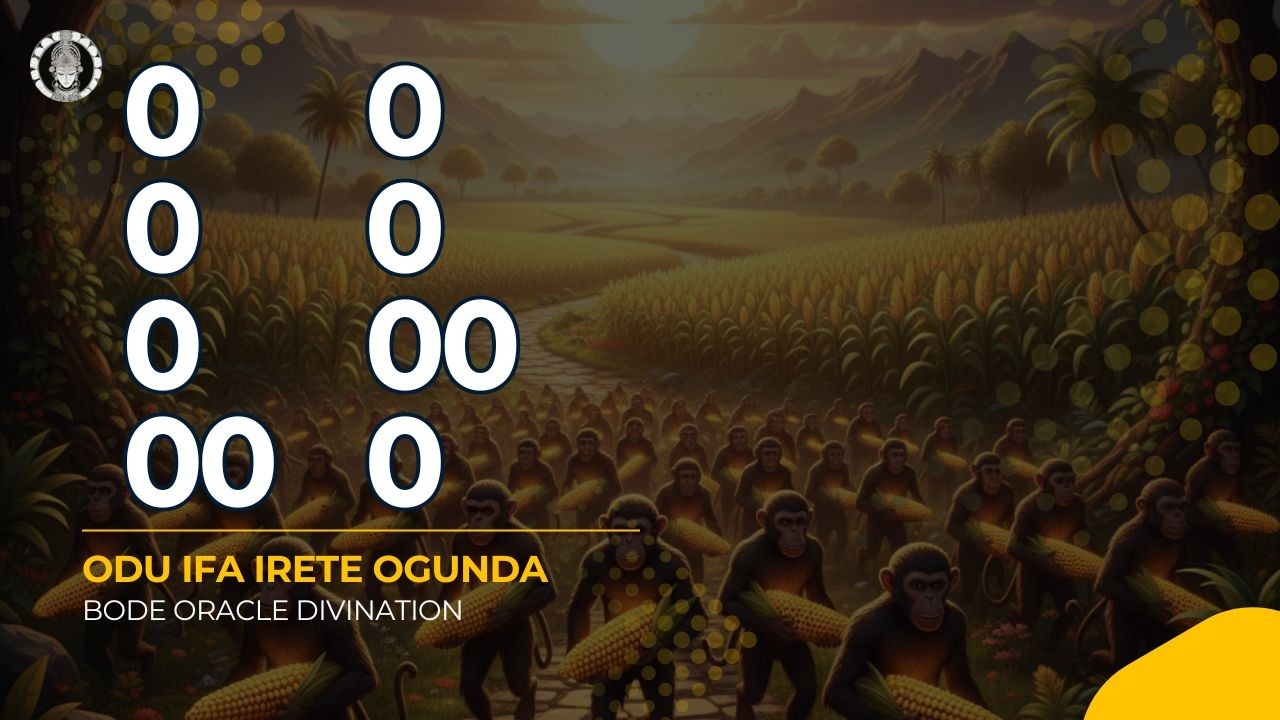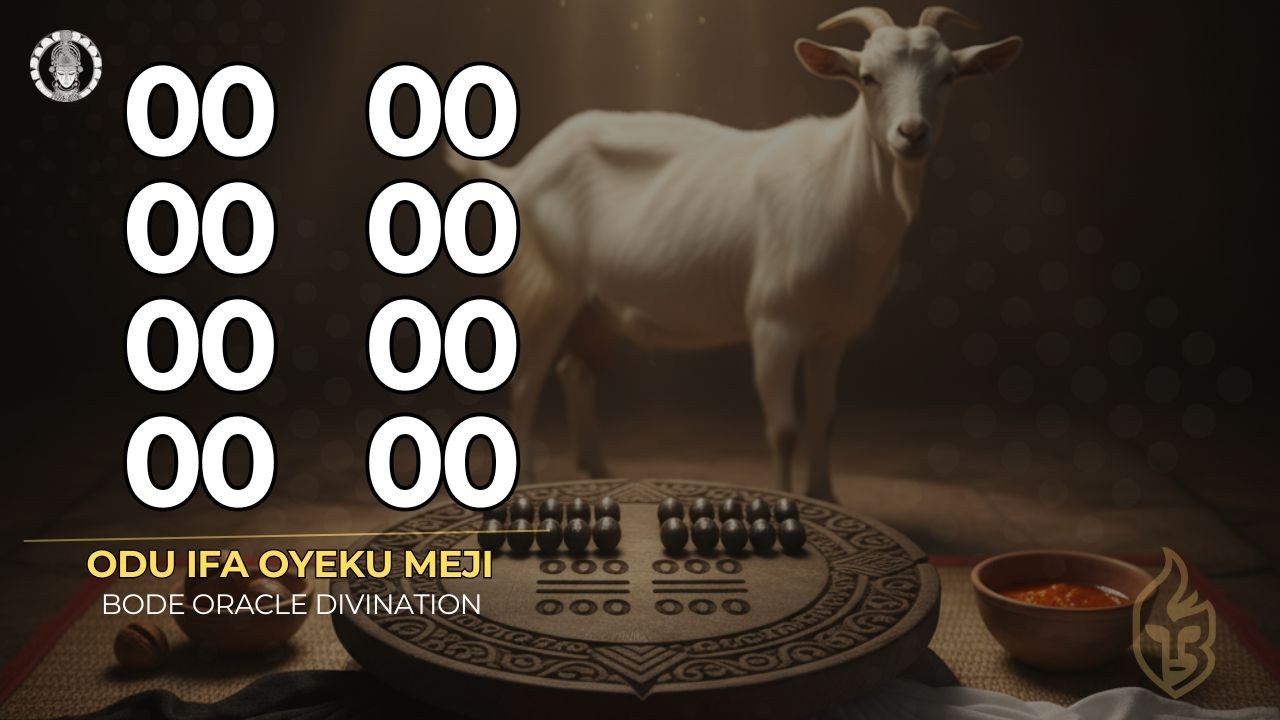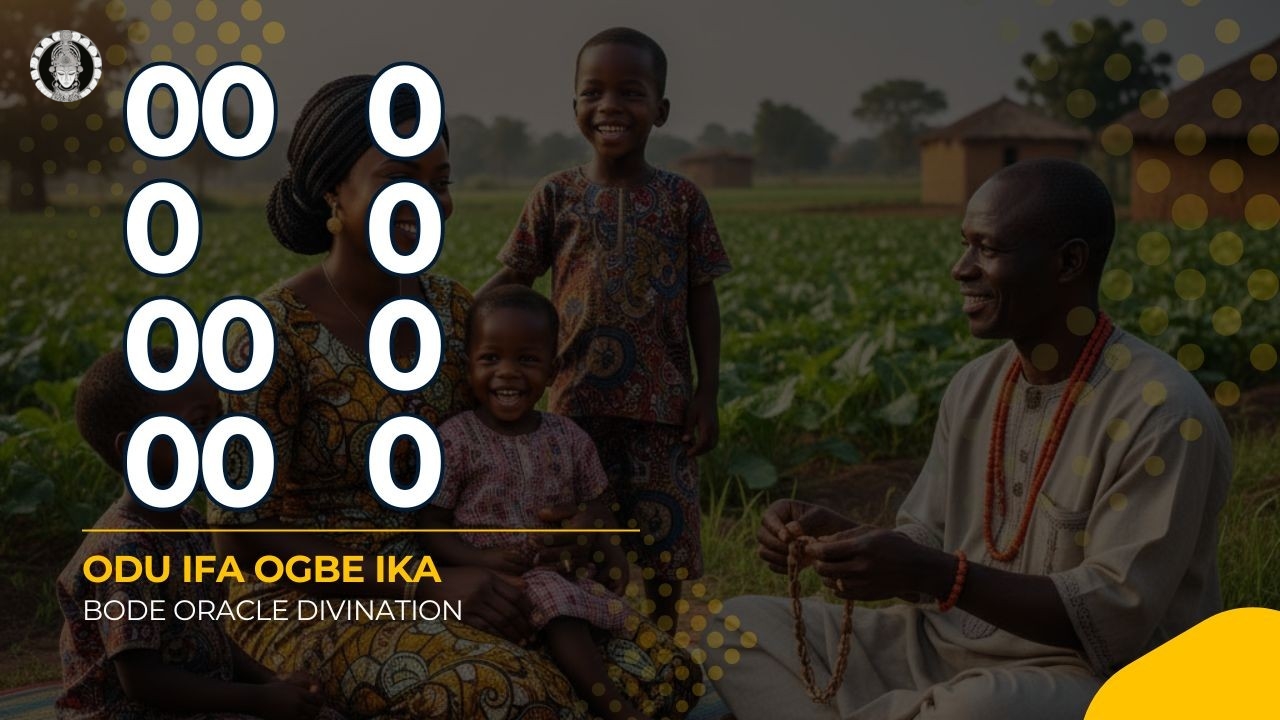Introduction to Odu Ifa Ogbe Ika (Ogbe Ka)
Odu Ifa Ogbe Ika, also known as Ogbe Ka, represents one of the 256 sacred divination signs in the Ifa corpus. This profound Odu carries messages of hope, transformation, and divine intervention in some of life's most challenging circumstances. Through the wisdom of Ogbe Ika, we learn how proper spiritual practice can overcome the tragedy of child loss, ensure success in unfamiliar territories, bring prosperity through righteous work, and guide us away from hasty decisions that lead to regret.
The divinations within Ogbe Ika address fundamental human experiences: the deep pain of losing children to Abiku, the anxiety of venturing into unknown places, the desire for recognition and success in our work, and the temptation to abandon commitments when difficulties arise. Each story serves as both practical guidance and spiritual instruction, demonstrating that when we align ourselves with divine wisdom through proper sacrifice and righteous conduct, even the most painful circumstances can transform into profound blessing. For comprehensive understanding of Ifa as a divination system, explore foundational documentation.
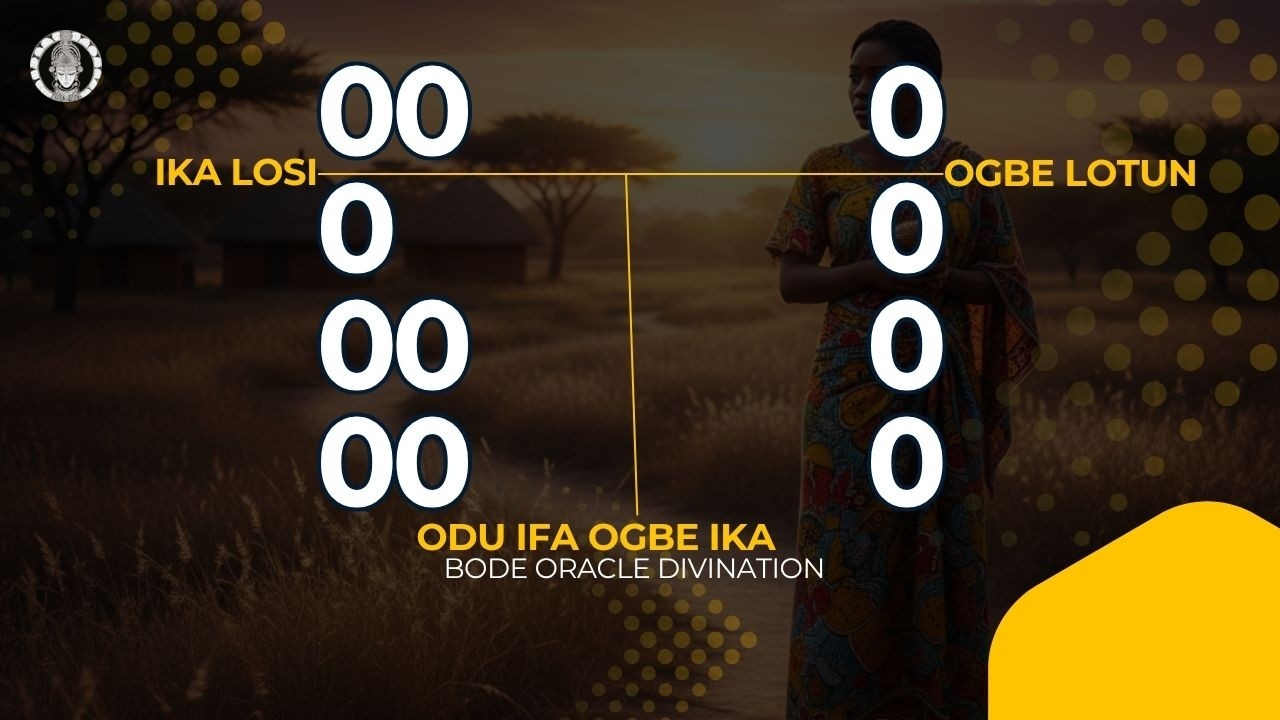
Ifa Divination for Adeyeri: Breaking the Cycle of Abiku
Understanding the Tragedy of Abiku
The divination of Adeyeri addresses one of the most heartbreaking experiences any parent can face: the repeated loss of children. In Yoruba cosmology, Abiku refers to children who are born only to die and return to the spirit world, creating a cycle of birth, brief life, and death that brings profound grief to parents. These are not ordinary deaths but spiritual patterns that require spiritual intervention to break.
Adeyeri, daughter of Olowu Mayini, found herself trapped in this painful cycle. Each time she gave birth, the child would not remain with her. The emotional toll of repeatedly experiencing motherhood only to have it snatched away drove her to seek spiritual help. This story resonates across cultures and centuries because the pain of child loss is universal, yet the solution Ifa offers is specific and powerful.
The Sacred Verse
Ogbè-Ká re'lé ọmọ ọṣìn
Ogbè Ká re'lé ọmọ ọrá
Ogbè Ká re'lé ọmọ alákòko gúnlele alede
Akéké sayin sáyin tó bá yan pa gédé
A si yan ṣe gédé
A d'Ifá fún Adéyẹrí ọmọ Olówu Máyíní
English Translation
Ogbè-Ká, let us go home, you are the child of ọṣìn,
Ogbè-Ká, let us go home, you are the child of ọrá,
Ogbè-Ká, let us go home, you are the child of alákòko gúnlele alede,
Like the delicate bird that flies and sings,
That always thrives.
Ifa divination was cast for Adeyẹrí, the child of Olówu Máyíní.
The Symbolism of the Delicate Bird
The imagery of the delicate bird that flies, sings, and thrives despite its fragility carries profound meaning. This represents the Abiku child who appears fragile and temporary, yet through proper spiritual intervention can become strong and permanent. The bird that was expected to fly away (die) instead remains, singing and thriving. This metaphor offers hope that what seems destined to leave can be made to stay through spiritual work.
The Transformation Through Sacrifice
When Adeyeri consulted the diviners, they revealed that she would indeed be blessed with children who would survive, but only if she performed the prescribed sacrifice. The text emphasizes that she complied fully with the instructions. This compliance proved transformative: she who had been giving birth to Abiku stopped having Abiku children. Her children began to remain with her. Gradually, she became one who enjoyed her children and reaped the fruits of motherhood.
The Joy That Follows Sorrow
The transformation in Adeyeri's life was so complete that her heart began to rejoice. The text describes how she praised the Awo (diviner), who praised Ifa, who praised Olodumare (the Supreme God). This chain of gratitude illustrates proper spiritual protocol and acknowledges that blessings flow from the divine through spiritual intermediaries to human recipients. When her mouth opened, a song emerged naturally, expressing the joy that had replaced years of sorrow.
The Song of Victory
Ọmọ lèré ayé o, ọmọ lèré
Ọmọ lèré ayé o, ọmọ lèré
Adéyẹrí dé ọmọ Olówu Máyini o
ọmọ lèrè ayé o, ọmọ lèrè.
A child is the joy of the world, a child is the joy.
A child is the joy of the world, a child is the joy.
Adeyẹrí has arrived, child of Olówu Máyíní,
A child is the joy of the world, a child is the joy.
Prescribed Offerings and Modern Application
While the specific offerings prescribed for Adeyeri are detailed in traditional Ifa practice, the principle remains constant: when facing the challenge of Abiku or repeated child loss, spiritual intervention through proper sacrifice is essential. In modern contexts, this guidance should be sought from qualified Babalawos who can prescribe appropriate offerings for contemporary situations. For deeper understanding of Ifa among the Yoruba people, consult scholarly resources.
Divination Instruction
Ifa declares that whoever gives birth to Abiku under Ogbe Ika should perform sacrifice to ensure the blessing of children. This is not merely advice but a spiritual prescription that, when followed with faith and proper procedure, transforms tragedy into joy and loss into lasting blessing.
Ifa Divination for Orisa Oko: Success in Unfamiliar Territory
The Anxiety of the Unknown Journey
This divination from Ogbe Ika addresses the universal human experience of uncertainty when contemplating a journey or venture into unfamiliar territory. Orisa Oko, referred to as "the new farmer" or "young farmer," planned to travel to Irawo to engage in commerce, specifically to exchange goods (oṣìn and ọrá). However, his heart was troubled with questions: How would this place treat him? Would his venture be successful? Would this new territory prove beneficial or harmful?
This represents the anxiety many face when contemplating career changes, relocations, business ventures, or any significant move into unfamiliar circumstances. The unknown generates legitimate concern because we lack information to predict outcomes. Orisa Oko's response to this anxiety demonstrates wisdom: rather than proceeding blindly or remaining paralyzed by fear, he sought spiritual guidance.
The Sacred Verse
Apèrèbugbájẹ
Ló d'Ifá fún ọkọ tuntun
Ti ńlọ Òde Íràwò
Tí ó ńlọ rèé gbọ ṣín, gbọrá
English Translation
Apèrèbugbájẹ
Cast Ifa divination for the young farmer
Who was traveling to the town of Irawo
To trade in oṣìn and ọrá.
The Wisdom of Spiritual Consultation Before Action
Orisa Oko consulted with diviners before undertaking his journey. The diviners revealed that he would indeed need to make this trip and that a sacrifice was required to ensure success. They prescribed specific offerings for him. Significantly, Orisa Oko did not merely listen to the prescription—he performed it before departing. This demonstrates the proper spiritual protocol: receive guidance, perform prescribed actions, and then proceed with confidence.
The Manifestation of Blessing
When Orisa Oko arrived at Irawo, the results exceeded his expectations. People began calling him as a diviner (Awo), and his work prospered. The place brought him peace and satisfaction. His initial anxiety about whether the location would be beneficial proved unfounded because he had properly prepared himself spiritually before arriving.
This demonstrates an important principle in Ifa: proper spiritual preparation does not eliminate challenges but positions us to receive blessings even in unfamiliar circumstances. Orisa Oko's success in Irawo came not from the inherent qualities of the place but from his spiritual readiness to receive what the place offered.
The Song of Gratitude
When Orisa Oko experienced success in Irawo, his response was immediate gratitude. He praised the Awo who had guided him, and the Awos praised Ifa. He burst into song, acknowledging the diviner who had properly guided him:
Apèrèbugbájẹ
Ló difá fún ọkọ tuntun
Ti ńlọ Òde Íràwò
Tí ó ńlọ rèé gbọ ṣín, gbọrá
Ki la Apèrèbugbájẹ
Awo rere la Apèrèbugbájẹ
Awo rere.
Apèrèbugbájẹ
Cast divination for the young farmer
Who traveled to Irawo
To trade in oṣìn and ọrá.
Who is Apèrèbugbájẹ?
A good diviner is Apèrèbugbájẹ,
A good diviner.
The Importance of Qualified Spiritual Guidance
Orisa Oko's song reveals a crucial teaching: the effectiveness of spiritual work depends significantly on the competence and integrity of the diviner. He praised Apèrèbugbájẹ as "a good diviner," acknowledging that the quality of spiritual guidance matters immensely. Not all who claim spiritual authority possess genuine competence. Orisa Oko's success came partly from consulting a qualified practitioner who gave accurate guidance and prescribed effective sacrifice.
Modern Applications
This divination speaks directly to contemporary situations: job relocations to new cities, starting businesses in unfamiliar markets, educational pursuits in different locations, relationship commitments with people from different backgrounds, and career transitions into new fields. The principle remains constant: when contemplating ventures into unknown territory, seek spiritual guidance, perform prescribed sacrifice, and proceed with confidence knowing you are spiritually prepared for what awaits.
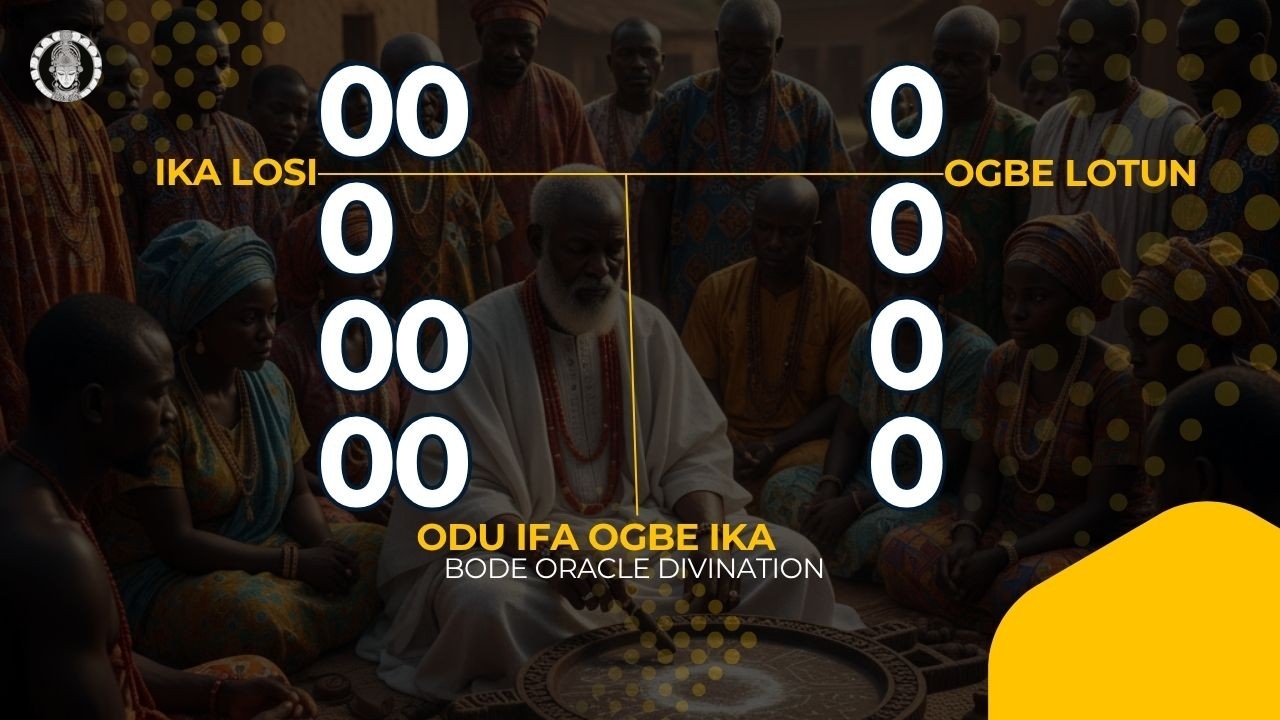
Ifa Divination for Orunmila's Journey to Oyo: Excellence Attracts Recognition
The Journey of the Master Diviner
This divination presents Orunmila himself as the protagonist, demonstrating that even the greatest spiritual practitioners must navigate unfamiliar territories and prove their worth through excellence rather than reputation alone. When Orunmila traveled to Oyo to practice divination, he entered a community that did not know him or his capabilities. His success there teaches profound lessons about spiritual integrity, the natural attraction of effective practice, and the proper relationship between a diviner and the communities they serve.
The Sacred Verse
Bùtù-bútù ònà ẹyọ
Ò kọmọ ní ìrin ẹsẹ
Yínyan ló ń kómọ
A difá fún Ogbè (Òrúnmìlà)
Lójó tí ó ńṣawo lọ Óyó ilé.
English Translation
The rough and uneven path
Does not teach children to walk,
Rather, it carries them.
Ifa divination was cast for Ogbe (Orunmila)
On the day he went to practice divination in Oyo.
The Metaphor of the Path and Walking
The opening verse contains rich philosophical meaning. A rough path does not teach a child to walk—instead, the child must be carried over it. This suggests that some learning cannot come through harsh experience alone; sometimes we need support and guidance. However, in the context of Orunmila's journey, it also implies that his spiritual knowledge would carry people over the rough paths of their lives, just as parents carry children over difficult terrain.
The Transformation of Oyo Through Righteous Practice
When Orunmila arrived in Oyo, he began performing Ifa divination for the people. The text reveals that "all things began to be well in Oyo." This statement carries profound implications: genuine spiritual practice produces tangible results in communities. People's problems found solutions, their questions received answers, and their lives improved through the guidance Orunmila provided. This was not manipulation or deception but authentic spiritual work that brought real transformation.
Gradually, even those who lived in the surrounding countryside began calling Orunmila as their diviner. His reputation spread not through self-promotion but through the quality and effectiveness of his work. This teaches that authentic spiritual authority emerges naturally from genuine competence and results.
The Reluctance to Leave and the Community's Response
So successful was Orunmila's practice in Oyo that he no longer wanted to return home. However, the text reveals an interesting dynamic: the people of Oyo also did not want to let him leave. This mutual attachment demonstrates the proper relationship between diviner and community. When spiritual work is genuine and transformative, both parties recognize the value of the relationship and desire its continuation.
The Joy of Successful Return
Eventually, after receiving those who would receive him and gathering those who would gather to him, Orunmila prepared to return home. Notably, after such success and recognition in Oyo, he still felt the call to return home. This teaches that no matter how successful we become in foreign lands, there remains something sacred about our origins and our home community.
When Orunmila returned home with joy and satisfaction, having prospered in Oyo, he burst into song:
Ogbè-ká relé ó
Má sùn nijú
Awo ti ó gbófá rere kíí gbé ijù
Ogbe Ka, let us go home,
Do not sleep in the dirt.
A diviner who receives good fortune should never dwell in desolation.
The Profound Teaching of the Song
Orunmila's song contains a powerful principle: "A diviner who receives good fortune should never dwell in desolation." This teaches that spiritual practitioners who work with integrity and effectiveness will naturally attract prosperity and recognition. They should not remain in poverty or obscurity because genuine spiritual work has inherent value that communities recognize and reward.
The phrase "do not sleep in the dirt" implies that one should not accept less than what their spiritual work merits. This is not about arrogance but about recognizing the value of authentic spiritual service and not undervaluing it through false humility or poor self-worth.
Divination Instruction
Ifa instructs that the person receiving this Odu should perform sacrifice so that blessings may meet them on the journey they intend to undertake. Whether literal travel or metaphorical journey into new ventures, proper spiritual preparation ensures success and recognition in unfamiliar places.
Applications for Modern Practitioners
This divination speaks to spiritual practitioners, professionals, and anyone whose work involves serving others. It teaches that excellence and integrity naturally attract recognition and reward. Those who maintain high standards, genuinely serve their communities, and produce real results need not worry about success—it will find them. However, proper spiritual preparation through sacrifice ensures that our gifts find receptive audiences and our work bears fruit.
Ifa Divination for Etipọnọla: The Cost of Refusing Spiritual Guidance
The Temptation to Abandon Commitment
This divination from Ogbe Ika presents a cautionary tale about the dangers of abandoning commitments without proper spiritual guidance, particularly in the context of marriage. Etipọnọla, wife of Ehoro (the rabbit), decided she wanted to leave her husband. Recognizing the seriousness of this decision, she went to consult diviners about her intention. This shows wisdom in seeking guidance, but her response to that guidance reveals a common human failing.
The Sacred Verse
Ogbè-ká rè kàá kaja
A difá fún Ètìpọnọlá aya Ehoro
English Translation
Ogbe Ka, let us go and cross over,
Cast Ifa divination for Etipọnọla, wife of Ehoro.
The Guidance Received and Rejected
When Etipọnọla consulted the diviners about leaving her husband, they gave her clear guidance: she should not leave Ehoro. However, if she was determined to leave despite this advice, she must perform sacrifice. This dual guidance represents Ifa's respect for human free will while also providing protection for those who choose paths against divine counsel.
The diviners warned that if she did not perform the sacrifice, she would eventually return to Ehoro. This was not a curse but a prediction based on spiritual insight—her new situation would prove worse than what she was leaving, forcing her back.
The Pattern of Selective Obedience
The text reveals a common human tendency: "Etipọnọla heard but did not obey." She consulted the diviners, demonstrating some spiritual awareness, but then refused to follow their guidance. She neither stayed with Ehoro as advised nor performed the protective sacrifice if she chose to leave. Instead, she simply departed, perhaps believing her own judgment superior to spiritual counsel.
The Consequences of Refusing Guidance
When Etipọnọla left Ehoro and established herself elsewhere, she expected improvement. Instead, the text reveals that "rather than things getting better for her, they became even worse." This demonstrates a profound truth: our perception of problems in our current situation may blind us to worse problems we will encounter elsewhere. The grass that appears greener often proves to be painted.
The difficulties she faced in her new situation forced Etipọnọla to reassess. She realized that "where she had come from was actually better than where she had gone." This painful recognition arrives after resources have been expended, time has been lost, and emotional energy has been wasted.
The Humbling Return
Faced with the reality that leaving Ehoro had been a mistake, Etipọnọla had no choice but to return to her husband. This return, undertaken from necessity rather than choice, likely carried shame and humiliation. The song she sang acknowledges both her identity and her decision:
Ètìpọnọlá aya Ehoro
Ètìpọnọlá aya Ehoro
N ó sì tún padà tún ọkọ mi fé.
Etipọnọla, wife of Ehoro,
Etipọnọla, wife of Ehoro,
I will go back and love my husband again.
The Wisdom of Patience and Spiritual Counsel
This divination teaches several crucial lessons. First, major life decisions—particularly those involving commitment relationships—should be made with proper spiritual guidance. Second, when we receive spiritual counsel, we should follow it even when it contradicts our immediate desires. Third, the problems we seek to escape by leaving a situation may be preferable to the problems we encounter in new situations.
The story also teaches about patience. Whatever difficulties Etipọnọla experienced with Ehoro might have been resolved through spiritual work while remaining in the relationship. Instead, her impatience led to a more difficult path that ultimately returned her to where she started, but only after unnecessary suffering.
Divination Instruction
Ifa declares that whoever receives Ogbe Ka should not abandon their spouse. This is not merely cultural conservatism but spiritual wisdom recognizing that marital challenges are often tests that, when properly addressed with spiritual guidance, lead to stronger relationships. Abandoning marriage without proper spiritual consultation and sacrifice often leads to regret and eventual return under more difficult circumstances.
The Deeper Teaching: Patience in All Endeavors
The text concludes with a profound teaching: "This Ifa teaches us to have patience with everything we do." This extends beyond marriage to all commitments and endeavors. Our culture often encourages us to quit when things become difficult, to seek new opportunities when current ones prove challenging. However, Ogbe Ika teaches that patience, combined with proper spiritual work, often transforms difficult situations into blessings, while impatience leads us into worse circumstances that teach us the value of what we abandoned.
Modern Applications
This divination speaks directly to contemporary situations: marriages facing difficulties, careers that have become frustrating, friendships experiencing conflict, and any commitment that has grown challenging. Before abandoning these relationships or situations, proper spiritual consultation is essential. If guidance counsels patience and spiritual work within the situation, that path typically proves wiser than departure. If departure is necessary, proper sacrifice ensures the transition leads to improvement rather than regret.
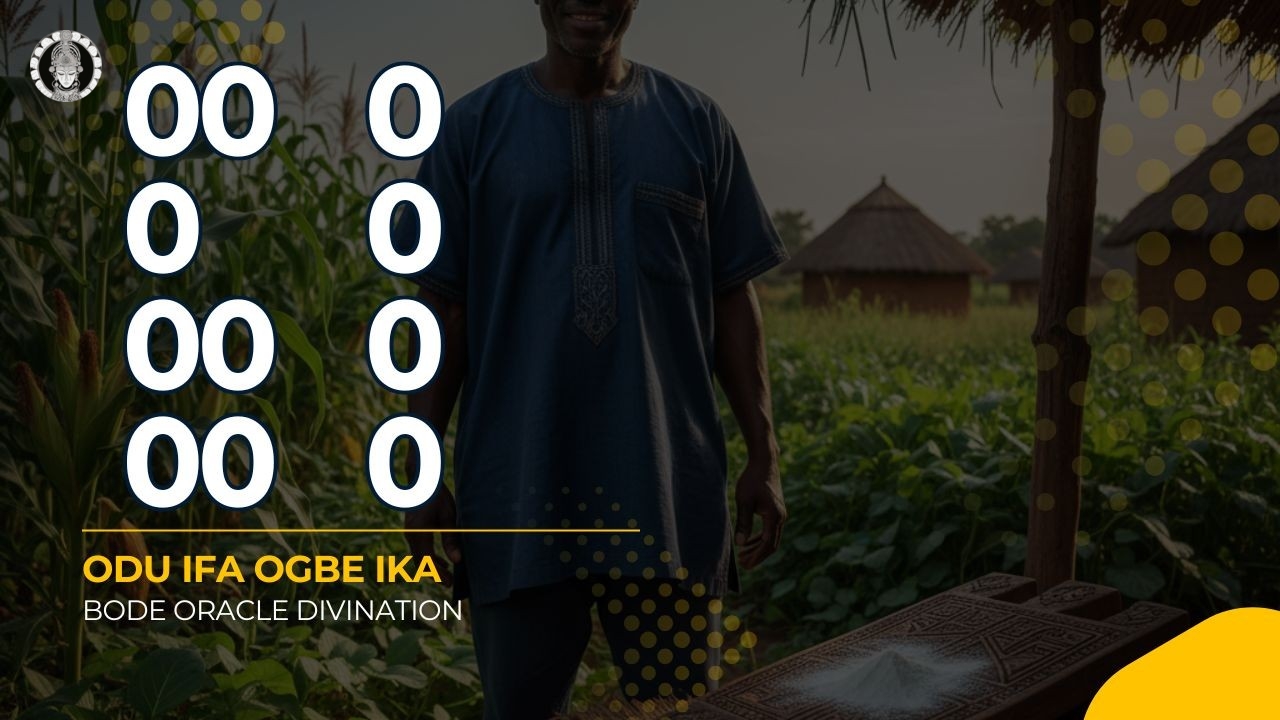
Core Teachings and Modern Applications of Ogbe Ika
The Transformative Power of Proper Sacrifice
Throughout all the divinations in Ogbe Ika, one principle remains constant: proper sacrifice, performed with faith and correct procedure, transforms circumstances from negative to positive. Adeyeri moved from the tragedy of Abiku to the joy of children who survived. Orisa Oko moved from anxiety about an unknown journey to prosperity in a new land. Orunmila moved from being unknown in Oyo to being highly valued and successful. Only Etipọnọla, who refused sacrifice, experienced continued difficulty.
This consistent pattern teaches that sacrifice is not optional in spiritual practice but essential. However, sacrifice is not mere ritual—it represents our willingness to invest in our own transformation, to align ourselves with spiritual forces, and to demonstrate faith through action. The physical offerings are vehicles for spiritual realignment, not magical transactions that force divine favor.
The Importance of Qualified Spiritual Guidance
Ogbe Ika emphasizes that the quality of spiritual guidance matters significantly. Orisa Oko specifically praised Apèrèbugbájẹ as "a good diviner" after achieving success. This recognition acknowledges that not all who claim spiritual authority possess genuine competence. Effective spiritual work requires practitioners who have proper training, authentic spiritual connection, and integrity in their practice.
For those seeking guidance today, this teaching emphasizes the importance of finding qualified Babalawos or spiritual practitioners who demonstrate genuine competence, maintain proper protocols, and produce real transformation in people's lives. Cheap or convenient guidance often proves expensive in consequences.
The Principle of Gratitude
A striking pattern throughout Ogbe Ika is the immediate expression of gratitude when blessings manifest. Adeyeri praised the Awo, who praised Ifa, who praised Olodumare. Orisa Oko sang praises to his diviner. Orunmila sang with joy upon returning home successfully. This chain of gratitude is not mere politeness but recognition of the spiritual forces and human intermediaries that enabled transformation.
In modern practice, cultivating gratitude remains essential. When prayers are answered, problems resolve, or blessings manifest, proper acknowledgment through praise, thanksgiving offerings, or testimony completes the spiritual circuit and ensures continued divine favor.
Patience Versus Impulsivity
The story of Etipọnọla serves as the counterpoint to the success stories in Ogbe Ika. While others succeeded through patience and proper spiritual procedure, she failed through impatience and refusal of guidance. Her story teaches that impulsive decisions made without proper spiritual consultation often lead to regret. The concluding teaching that "Ifa teaches us to have patience with everything we do" applies to marriage, career, friendships, spiritual development, and all significant endeavors.
In our contemporary culture that celebrates quick results and easy exits, this teaching offers crucial wisdom. Some situations require persistence and spiritual work rather than abandonment. Knowing which situations require patience and which require departure is exactly why spiritual consultation proves invaluable.
Children as Ultimate Blessing
The centrality of Adeyeri's story in Ogbe Ika, with its refrain "children are the joy of the world," reminds us that in Yoruba philosophy, children represent the ultimate blessing. They are not merely personal satisfaction but the continuation of ancestral lineage, the carriers of culture and tradition, and the tangible manifestation of divine favor. For comprehensive understanding of African Traditional Religions and Ifa Divination, explore scholarly resources.
In modern contexts where some choose not to have children, this teaching can be understood more broadly as referring to legacy, what we nurture and leave behind, and the ways we invest in future generations even if not through biological children. The principle remains: nurturing life and ensuring continuity brings profound joy and meaning.
Excellence Attracts Recognition
Orunmila's success in Oyo teaches that genuine competence and integrity naturally attract recognition and reward. In professional contexts, this means that focusing on excellence in our work, serving others effectively, and maintaining integrity ultimately brings greater success than aggressive self-promotion or shortcuts. The principle "a diviner who receives good fortune should never dwell in desolation" applies to all professionals: those who do excellent work should value it appropriately and not accept less than what their contributions merit.
Applications for Contemporary Life
Ogbe Ika speaks to numerous modern situations. For parents experiencing fertility challenges or infant loss, it offers hope through spiritual intervention. For those contemplating career changes, relocations, or new ventures, it provides guidance on proper spiritual preparation. For professionals seeking recognition, it teaches that excellence combined with integrity attracts opportunities. For couples experiencing marital difficulties, it counsels patience and proper spiritual consultation before making irreversible decisions. For everyone, it teaches the transformative power of proper sacrifice, the importance of qualified guidance, and the necessity of patience.
Additional Resources
Internal Links
- Complete Guide to Ogbe Ika - Detailed information, taboos, and practices
- Ogbe Ika Blog Post
- Bode.ng Blog - Extensive collection of Ifa and Yoruba spirituality articles
- Complete Odu Ifa Directory
- Bode.ng - Divination Services and Community Resources
External Resources
- African Traditional Religions: Ifa Divination - Duquesne University
- Ifa Divination System - Wikipedia
- Ifa of the Yoruba People of Nigeria - UNESCO
- Algebraic Characterization of Ifa Main Divination Codes - ScienceDirect
- UNESCO Recognition of Ifa Divination System
Connect With Us on Social Media
- BODE Oracle on TikTok
- BODE Oracle on YouTube
- BODE Oracle on Facebook
- BODE Oracle on X (Twitter)
- BODE Oracle on Pinterest
Visit Bode.ng to explore more divination teachings, participate in quizzes and polls, and connect with our community of practitioners and learners. Register today to access exclusive content and personalized guidance on your spiritual journey.
Frequently Asked Questions And Answers About Odu Ifa Ogbe Ika (Ogbe Ka)
Find answers to common questions about this sacred Odu Ifa and its divination teachings
Ogbe Ika, also known as Ogbe Ka, is one of the 256 sacred Odu (divination signs) in the Ifa corpus. It carries powerful messages about overcoming child loss through Abiku, achieving success in new ventures and journeys, prosperity through righteous practice, and maintaining harmony in marriage. This Odu emphasizes the importance of proper sacrifice, patience, and gratitude for blessings received.
The divination of Adeyeri in Ogbe Ika specifically addresses the tragedy of Abiku, where children are born but do not survive. Through proper sacrifice as prescribed by Ifa, parents can break this cycle and ensure their children remain with them. The story demonstrates that compliance with spiritual guidance transforms repeated loss into the joy of children who live and thrive.
The divination of Orisa Oko reveals that when contemplating journeys or new ventures, proper sacrifice ensures success and prosperity in unfamiliar territories. The Odu teaches that uncertainty about new endeavors should be addressed through spiritual consultation and sacrifice before departure. When these protocols are followed, the new location brings unexpected blessings and opportunities.
Orunmila's journey to Oyo demonstrates that righteous spiritual practice brings prosperity and honor even in unfamiliar places. When a diviner practices with integrity and brings genuine transformation to a community, they become valued and their work bears abundant fruit. The verse teaches that a diviner who receives good fortune should never dwell in desolation, emphasizing that spiritual effectiveness naturally attracts blessings and recognition.
The divination of Etipọnọla, wife of Ehoro (rabbit), serves as a powerful warning against abandoning marriage relationships without proper spiritual guidance. Despite being advised to perform sacrifice if she intended to leave her husband, Etipọnọla refused and departed anyway. Her new situation proved worse than what she left, forcing her to return. This story teaches the importance of patience, proper spiritual consultation before major decisions, and the wisdom of not abandoning relationships impulsively.
This central refrain from the Adeyeri divination expresses the profound truth that children represent not just personal blessing but the continuation of life, culture, and human joy itself. In Yoruba philosophy, children are the ultimate blessing because they ensure ancestral continuity, provide care in old age, and represent the tangible manifestation of divine favor. The phrase emphasizes that material wealth means little without the joy and fulfillment that children bring.
Every divination in Ogbe Ika demonstrates the direct correlation between performing prescribed sacrifice and receiving promised blessings. Adeyeri performed sacrifice and overcame Abiku. Orisa Oko performed sacrifice and prospered in Irawo. Those who refuse sacrifice, like Etipọnọla, face continued struggle. The Odu teaches that sacrifice is not optional but essential, representing our commitment to spiritual alignment and our willingness to invest in our own transformation.
Apèrèbugbájẹ, the name of the diviner who cast Ifa for Orisa Oko, represents the quality of a good and effective spiritual practitioner. When Orisa Oko praised this diviner after achieving success, he declared 'A good diviner is Apèrèbugbájẹ.' This teaches that the effectiveness of spiritual work depends not just on the client's compliance but also on the competence, integrity, and spiritual authority of the diviner performing the work.
Ogbe Ika teaches that uncertainty about journeys, ventures, or major life decisions should be addressed through proper spiritual consultation before taking action. Both Orisa Oko and Etipọnọla faced uncertainty, but their outcomes differed based on their response. Orisa Oko consulted Ifa, performed sacrifice, and succeeded. Etipọnọla consulted but refused sacrifice, leading to regret. The lesson is clear: seek guidance, perform prescribed sacrifice, and proceed with confidence.
Throughout Ogbe Ika, those who receive blessings immediately express gratitude through praise. Adeyeri praised the Awo, who praised Ifa, who praised Olodumare. Orisa Oko sang praises when his journey proved successful. Orunmila sang with joy upon returning home prosperously. This pattern teaches that gratitude is not merely politeness but recognition of the spiritual forces that enabled our success. Proper gratitude completes the spiritual circuit, ensuring continued blessings.
The refrain "Ọmọ lèré ayé o, ọmọ lèré" (A child is the joy of the world) expresses a fundamental Yoruba value: children represent humanity's greatest blessing, the continuation of lineage, and the fulfillment of parental purpose. In the context of Adeyeri's story, it celebrates the transformation from repeated loss to lasting joy, from grief to gratitude, demonstrating that proper sacrifice can restore what seemed permanently lost.
You can explore comprehensive information about Ogbe Ika through several resources:
- Complete Guide to Ogbe Ika - Detailed taboos and practices
- Ogbe Ika Blog Post - Extended teachings
- Bode.ng Blog - Extensive articles on Ifa spirituality
- Complete Odu Ifa Directory - All 256 Odu
- Bode.ng - Divination services and community
Connect with us on social media for regular teachings: TikTok, YouTube, Facebook, X (Twitter), and Pinterest @BODEOracle.
